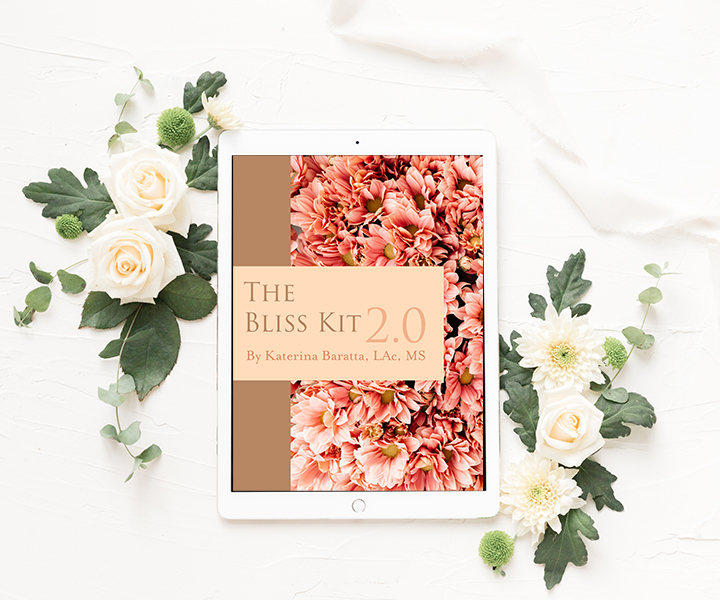Hormone imbalance and anxiety
Could your anxiety be a sign of hormone imbalance?
This article will help you in 3 ways.
First, we’ll discuss why the link between hormones and anxiety exists.
Then you’ll learn the tell-tale signs to look out for that show you that there’s probably a hormone imbalance going on for you.
And finally, you’re going to get some solid tips to start to regulate your hormones naturally to calm anxiety.
The link between hormone imbalance and anxiety
Hormones are chemical messengers that are released into your bloodstream so different parts of your body can talk with each other.
They get released at regular intervals throughout the day—in order to signal sleep, digestion, or menstruation, for example,— and also at other times in response to specific events in your body.
If, for some reason, your hormones aren’t releasing the way your body needs them to, it’s called a hormone imbalance.
Hormone imbalance can happen for a variety of reasons, and we’ll talk about some of them in a moment.
But first let’s talk about the impact hormone imbalance has on anxiety.
Anxiety is a response to stress.
And stress can come from many different places.
Stress can be an internal response to something that happens outside of you, like the rush of adrenaline you feel when someone yells at you, or when your body is in immediate danger.
It can also happen when your mindset doesn’t match up with your Truth, like when you know you need to change something in your life but haven’t made that change yet, or simply when you wish things were different than they are.
(If this is something you’d like to work on, click here to download the free Bliss Kit PDF which will help you retrain the thought patterns embedded in your neurology for more ease, joy, and inner peace.)
And in the case of hormone imbalance, stress arises because your body is having a hard time performing the functions it needs to perform.
But whatever the cause of stress, stress is always a reaction that happens in your body.
You might think stress is all in your head, but if you tune into your body you’ll quickly realize that this just isn’t true.
Thoughts are linked to the body.
Every thought has a physical reaction in the body, and every physical reaction in the body elicits a specific type of thought.
And when the reactions in your body signal stress, your mind jumps to try to find a solution to that stress.
The problem is, when it comes to something like hormone imbalance, the mind can’t find a solution to the stress.
Because the mind can only use what it knows.
And most of us haven’t been trained to understand the signs and symptoms our body is sending us that point toward hormone imbalance (or any other kind of imbalance), so when imbalance arises, the mind doesn’t know what to do that would actually be helpful.
And this is why hormone imbalance leads to anxiety.
Because anxiety happens when your mind is tries to think its way out of the stress you feel in your body, and the anxious mind is relentless in its search.
But unfortunately, because the link goes both ways, every time your mind suggests a thought that doesn’t work, that doesn’t take care of the stress it’s perceiving in the body, an even larger stress response is mounted.
You can’t think your way out of hormone imbalance.
Instead, you have to know how to recognize it, and then make the changes you need to heal the root cause of that hormone imbalance.
(Hang tight, we’ll get to both in just a minute.)
It’s only when you address the root cause of hormone imbalance that anxiety that’s related to hormone imbalance can subside.
Of course, anxiety can also come from other sources of stress, especially trauma patterns that are stored in the nervous system.
And this why a holistic approach is so important when it comes to healing anxiety.
Anxiety is showing you with painful clarity that something in your life needs course correcting.
And there’s a high likelihood that it’s more than one thing.
If you’d like to learn more, click here to sign up for my (free) masterclass, Decoding Anxiety, and learn what else your anxiety is trying to tell you.
When it comes to hormone imbalance in particular, there are 3 telltale signs to look for:
1. Timing
Hormones are like your type-A bestie.
They pride themselves in being reliable, and they love being prepared so they can do their job well.
Which is why they really shine in predictable, structured environments.
So if you notice that anxiety and other symptoms flaring at the same time every day, or, if your body menstruates, the same phase of your monthly cycle, then that’s a really good sign that something’s up with your hormones.
2. Energy
Hormones have a big impact on energy levels.
Cortisol, best known for being a stress hormone, is also responsible for waking you up.
If you can’t think clearly until you’ve had your coffee in the morning, there’s a good chance a cortisol imbalance is to blame.
But fatigue isn’t the only energy symptom to be on the look out for.
If you can’t get yourself to sleep at night, there might also be an imbalance with the sleep hormone melatonin added in the mix.
Restlessness in general is often a sign of hormone imbalance due to chronic stress.
When stress becomes a habit, your mind and body are wired on high alert all the time and you have a hard time settling down.
This is part of the anxious mind phenomenon of always trying to find a way to fix the discomfort you’re feeling from stress in your body.
But if that stress has become a chronic habit, you can’t fix it by doing or thinking more.
If anything, you have to teach your nervous system that it’s safe to relax, that it’s okay to do and think less.
And when you finally learn to settle down, less stress hormones will be released, bringing more balance to your whole system.
Thyroid hormone is another hormone that is susceptible to imbalance in many people, especially women.
About 1 in 8 people in biologically female bodies experience hypothyroidism, or not enough thyroid hormone, at some point in their lives.
And because thyroid impacts the speed at which things happen in your body, including your heart rate and metabolism, it can have a direct impact on your energy and anxiety levels.
3. Digestion
The final big clue pointing toward a hormone imbalance can be found in the state of your digestion.
Healthy digestion means 1-2 well-formed stools a day, without straining, gas, bloating, or discomfort.
Nausea, heartburn, excessive burping and gurgling should also be absent.
Anything else is a sign that your digestive tract could use a bit of help.
And this is important when it comes to hormone balance for two reasons.
First off, estrogen, progesterone, and thyroid hormones, in particular, can have a big impact on the movement in your digestive tract.
So if you have loose stools, estrogen might be to blame because causes spasms in your colon that can, *ehem*, move things along a bit too quickly. 1
Low levels of estrogen have also been directly linked to anxiety, making menstruating people more vulnerable to stress patterns (trauma) in their nervous system right after ovulation when estrogen levels drop, and then again the week before and week of menstruation. 2
If you feel bloated and constipated, on the other hand, especially right before menstruation, high progesterone levels might be to blame.
Constipation may also be a sign of low thyroid levels, which, as mentioned above, is also linked to anxiety. 3
And secondly, studies are starting to show that the root of hormone imbalance could have a lot to do with the balance of microbes in your gut microbiome. 4
All those little critters that line your digestive tract can make or break your body’s ability to produce the right amount of the right hormones at the right time.
What’s more, the ecosystem in your digestive tract itself has a huge impact on your digestive symptoms as well as anxiety levels itself. 5
So the importance of gut health really can’t be understated when it comes to hormone balance and anxiety.
What to do if you suspect a hormone imbalance is contributing to your anxiety:
One of the best things to do if you suspect that hormone imbalance is contributing to your anxiety is to consult a holistic health practitioner.
A trained professional can help you synthesize all the messages you body is sending you so you can heal the root of your troubles directly, often saving you years of trial and error.
If this is something that you’re curious about, email me now to set up a free consultation.
But there are also some strategies you might want to try on your own to help your hormones flow more comfortably.
Here are my top suggestions:
• Herbal medicine •
Medicinal herbs can be incredibly powerful and helpful in healing hormone imbalance.
And the two that I prescribe most frequently are vitex and ashwagandha.
*Always consult your healthcare provider before taking herbs, especially if you are pregnant, nursing, or have preexisting conditions.
Vitex
Vitex, also called Chaste Tree Berry, is a pungent, drying herb that is primarily used to help regulate the luteal phase (the phase before menstruation when many women experience PMS symptoms).
If your anxiety tends to spike right before your period, you can take 2 dropper-fulls of vitex tincture 3 times a day (or 3 full droppers, twice a day) before meals for a couple of months and see if it helps.
Do note that vitex should not be taken during pregnancy, and it may have an impact on the effectiveness of birth control and other hormone therapy.
Ashwagandha
Ashwagandha is an earthy, slightly bitter root that is traditionally taken in powdered form mixed with a bit of ghee and raw honey.
In its country of origin, India, ashwagandha is said to “instill the vitality of a horse” in those who take it.
In her book, Herbal Medicine from the Heart of the Earth, Dr. Sharol Tilgner says that ashwagandha is “best suited to persons who are debilitated or exhausted while agitated or under stress.”
Ashwagandha is considered to be adaptogenic, which means that it helps to regulate stress levels in the body, and therefore has a direct impact on anxiety levels too.
Despite the fact that it is considered safe for pretty much everyone except pregnant women (and that’s only because there haven’t been enough studies to confirm safety), ashwagandha is an impressive ally in helping you heal anxiety holistically.
Click here to download the (free) Best Herbs for Anxiety PDF if you’d like to learn more about using herbal medicine to heal different kinds of anxiety.
• Routine •
We already talked about how hormones thrive in predictable and structured environments.
And your body is that environment.
So the more routine you put into your lifestyle (without stressing yourself out trying to be rigid about it) the more you’ll support your hormones.
This is especially true for sleep and mealtimes.
As much as you can, practice good sleep hygiene.
Go to bed and wake up around the same time everyday, shifting slightly with the seasons.
Ideally, you’ll be in bed for a total of 8 1/2-9 hours, falling asleep 2-4 hours after sunset most of the year and waking up just before sunrise.
Having set mealtimes can also be a huge boon to your hormone health.
Because hormones like to know what’s coming so they can follow their predictable order of operations.
When you eat at the same time every day the hormones that make you hungry will already be activated, getting your gastric juices flowing.
And the hormones that tell your brain that you’re full will have an easier time sending their messages, too.
Added bonus, if you struggle with weight fluctuations or weight loss, this may be your ticket to ending that battle against your body.
• Gut Health •
And finally, gut health.
You already know that gut health is essential for healthy hormone flow.
And the best way to do this is by filling your diet with prebiotic, probiotic, and whole foods that balance the elements in your system.
But the relationship goes both ways.
Food and gut health doesn’t just affect anxiety, stress levels also have an impact on gut health.
So designing your lifestyle to prioritize stress-management is really important if you want to reduce anxiety naturally.
And if you’re ready for more personalized support in healing the root causes of your anxiety, email me now to set up a free consultation.
I can’t wait to see where this takes you!
References:
1 https://www.health.com/condition/digestive-health/gut-hormone-link
2 https://news.harvard.edu/gazette/story/2012/08/estrogen-and-female-anxiety/
3 https://pubmed.ncbi.nlm.nih.gov/20351569/
4 https://www.frontiersin.org/articles/10.3389/fmicb.2021.711137/full
5 https://www.researchednutritionals.com/wp-content/uploads/2017/04/gut-brain-axis-how-the-microbiome-influences-anxiety-and-depression.pdf
6. Herbal Medicine from the Heart of the Earth by Dr. Sharol Tilgner





